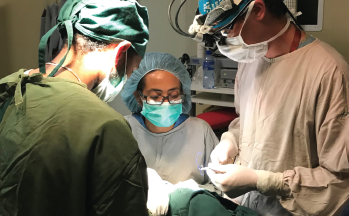
Dr. Wiedermann and his team perform surgery at Ayder Comprehensive Referral Hospital
in Mekelle, Ethiopia.
Courtesy Dr. Wiedermann
Josh Wiedermann, MD, is an otolaryngology–head and neck surgeon with Ayder Comprehensive Referral Hospital of Mekelle University in Mekelle, Ethiopia. He recently completed his residency at George Washington University Hospital in Washington, D.C., and his pediatric fellowship at Northwestern’s Lurie Children’s Hospital in Chicago. He has recently moved to Mekelle, Ethiopia with the mission of helping to build an otolaryngology residency program. ENTtoday talked to Dr. Wiedermann about his involvement in the program.
Explore This Issue
November 2018ENTtoday: Why did you join a residency program abroad?
Dr. Wiedermann: Two things drove my desire. The first was a passion to teach that grew roots in medical school at George Washington University. I joined a medical education concentration track that allowed me to learn more about the art and science of education. Second, I was fortunate to be able to travel to Botswana the summer between my first and second years of medical school to join the Baylor International Pediatric AIDS Initiative there. I was able to contribute to educational modules about pediatric AIDS, and the experience also instilled in me a desire to contribute to medical education efforts in resource-poor settings.
My love for teaching and international healthcare continued during my otolaryngology residency, but I also came to realize that I wanted to accomplish more meaningful and long-lasting contributions than I could achieve with just a few-month stay in an international setting. After searching through various options, I flew to Mekelle in Ethiopia during my fellowship for a whirlwind visit. I met with the otolaryngology group, including a fresh cadre of residents, at Ayder Comprehensive Referral Hospital and Mekelle University.
It was love at first sight for me. The welcome was overwhelmingly enthusiastic, and everyone seemed excited for the opportunity, especially the new residents. I knew that I wanted to invest at least a year of my early career in helping this wonderful group develop a high-quality otolaryngology training experience. It was a way to create a self-sustainable and efficient educational environment to improve the health of a population. After all, the opportunity to provide healthcare to those who need it is why most of us become doctors in the first place.
Every day I am pushed out of my comfort zone, and every day I learn something new. —Josh Wiedermann, MD
ENTT: How does the program work?